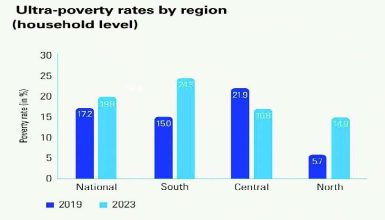IMF urges govt to restructure debt
The International Monetar y Fund (IMF) has urged the government to prioritise debt restructuring, a shift to private-led sector growth and price stabilisation to anchor the recently approved $175 million Extended Credit Facility (ECF) programme.
In a statement posted on its website, the Fund said that the new ECF programme is expected to restore macroeconomic stability, catalyse growth and unlock external financing to correct the economic imbalances that followed exogenous shocks such as Cyclone Freddy and the cholera outbreak.

IMF second deputy managing director Gita Gopinath, who chaired the board meeting on Wednesday, reiterated the call to prioritise debt restructuring amid concerns that the debt service is “eroding the country’s limited fiscal space”.
She said: “Successful external debt restructuring is vital as there is no reasonable mix of adjustment and financing alone that can focus on managing the “political economy” and the public’s expectations on fiscal spending to remain on track with the IMF conditionality.
In a WhatsApp response, she said: “The ECF requires controlled spending for us to bring all other sectors on track.
“However, we cannot be talking of reduced government spending while receiving ECF and at the same time we want to be people’s favourites by spending more to cushion them. If we are not careful, it will jeopardise the ECF.”
Agreeing with Bangara, Mzuzu University economics lecturer Christopher Mbukwa said the perceived unwillingness by controlling officers and senior officers to comply with the public finance management reforms could undermine the austerity measures proposed by the fund, including those announced by President Lazarus Chakwera on Wednesday night.
He said: “The other threat is whether our bilateral and commercial creditors will be willing to reach debt restructuring or debt relief altogether. This is because any further delays in debt restructuring or relief would be undoing the intended benefits of the programme.”
In an earlier interview following an announcement that the government has secured an ECF programme with the Fund, economist Joseph Mwanamvekha, a former Minister of Finance under former president Peter Mutharika’s regime, said the Tonse Alliance would have a tough time implementing the policy reforms under the agreement.
He said: “Malawi committed to ensure that interest rates remain positive, which means that interest rates have to be higher than inflation. This will be tough because raising the policy rate further will push up the cost of borrowing, which will have repercussions on economic growth and job creation.
“Re-aligning the formal exchange rate with the parallel rate on the black market would also mean devaluing the kwacha. That can trigger inflation. So, these are all tough conditions that the Tonse Alliance administration will have to conform to.”
The Reserve Bank’s decision to devalue the kwacha by 44 percent last week, a development that resulted in the local unit trading at K1 700 to the dollar, sparked public outcry amid concerns it would push up the cost of living in the country.





